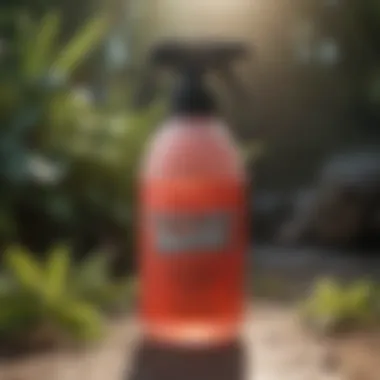Peppermint Mosquito Spray: A Natural Solution


Intro
As households seek alternative methods for pest control, peppermint mosquito spray emerges as a compelling candidate. This article explores its efficacy, preparation, and various applications. Many homeowners are increasingly aware of the need for solutions that are effective yet gentle on the environment. Peppermint oil has gained recognition not only for its refreshing scent but also for its potential to repel mosquitoes. Understanding this natural alternative could lead to safer pest management practices.
Pest Identification
Mosquitoes are a common nuisance, especially in warmer climates. To effectively tackle these pests, identification is key.
Common Household Pests
In the realm of household pests, mosquitoes are often the most bothersome. Different species can invade residences, including the Aedes aegypti, Culex pipiens, and Anopheles quadrimaculatus. Each species has unique behaviors and habitats, which can influence control measures. For instance, Aedes aegypti tends to thrive in urban areas, laying eggs in standing water found in containers.
Signs of Infestation
Detecting a mosquito problem early is crucial. Look for:
- Increased mosquito activity during evenings or nights.
- Bites or itchy skin irritations after being outdoors.
- Presence of standing water, which serves as breeding grounds.
Preventing Mosquito Infestations
Preventing infestations is an effective approach to managing mosquitoes. This often involves a combination of environmental modifications and routine home maintenance.
Environmental Modifications
Creating a less favorable environment for mosquitoes can significantly decrease their presence. Consider these modifications:
- Eliminate standing water: Ensure containers, bird baths, and gutters are regularly emptied and cleaned.
- Trim vegetation: Keep shrubs and grass well-trimmed to remove hiding spots.
Home Maintenance Tips
Regular home maintenance is essential in preventing mosquito incursions. Some effective practices include:
- Repairing window screens to prevent mosquitoes from entering.
- Sealing gaps around doors and windows.
- Using air conditioning instead of leaving doors open.
DIY Pest Control Solutions
Many homeowners prefer DIY solutions for pest control. Peppermint mosquito spray fits perfectly within this approach.
Natural Remedies
Using peppermint oil, a natural repellent, is both convenient and effective. The oil can deter mosquitoes without harsh chemicals. A simple recipe to create peppermint mosquito spray involves mixing water with a few drops of peppermint essential oil in a spray bottle.
DIY Traps and Barriers
Apart from sprays, consider setting up traps or barriers. You can create simple traps using sugar water to attract and capture mosquitoes. To enhance effectiveness, strategically place these traps in areas with high mosquito traffic.
Important: While peppermint mosquito spray is an effective repellent, it may not provide full protection against all mosquito species. A combination of methods usually yields the best results.
Closure
Peppermint mosquito spray serves as a useful and eco-friendly alternative in the fight against mosquito infestations. By understanding pest identification, implementing preventive measures, and applying DIY solutions, homeowners can effectively manage these pesky insects. Engaging with natural methods like peppermint is not just a trend; it reflects a shift towards safer pest control alternatives for families and the environment.
Intro to Peppermint Mosquito Spray


Peppermint mosquito spray serves as an intriguing alternative in the realm of pest control. Many people seek organic or natural options today. Utilizing peppermint oil for repelling mosquitoes not only promotes a healthier environment but can also enhance comfort during outdoor activities. Without relying on harsh chemicals found in conventional repellents, this method appeals to those prioritizing safety for their families and pets.
Natural insect repellents have gained attention over the years. Homeowners, especially, are more conscientious regarding the products they use in their vicinity. This calls for an exploration of alternatives like peppermint oil. Understanding the historical context of its use and identifying its advantages can provide a solid foundation on this topic.
Additionally, the potential benefits of peppermint mosquito spray extend beyond mere insect repelling. For example, the refreshing scent can also improve the atmosphere of your outdoor spaces. This spray caters to a desire for both effectiveness and a pleasant olfactory experience. Therefore, this introduction serves to establish the relevance of exploring peppermint's efficacy and preparation.
"Natural alternatives have shown promise, especially when formulated correctly."
As we move into the historical context, we will delve into how peppermint has been regarded as a pest deterrent over time, setting a backdrop for its current applications.
Chemical Composition of Peppermint Oil
Understanding the chemical composition of peppermint oil is crucial for appreciating its efficacy as a mosquito repellent. The oil is derived from the leaves of the peppermint plant and comprises various active compounds that contribute to its aroma and insect repellent properties. These compounds are not only responsible for the characteristic scent of peppermint but also possess biological activities that can deter pests.
Active Compounds and Their Properties
Peppermint oil contains several key active compounds, notably menthol and menthone. Menthol, which makes up a significant portion of peppermint oil, has been observed to have antimicrobial and refreshing properties, making it popular in various applications beyond pest control, such as in cosmetics and food preparation.
Menthone is another important component, contributing to the oil’s distinctive fragrance. Research has shown that these compounds can interfere with the sensory perception of mosquitoes, making it difficult for them to locate their hosts. The properties of peppermint oil extend beyond mosquito repellent activities, revealing its potential in stress relief and relaxation, often used in aromatherapy.
Mechanism of Action Against Mosquitoes
The mechanism by which peppermint oil acts against mosquitoes relies on its aroma and chemical reactions. When peppermint oil is applied to the skin or environment, it emits a strong scent. This scent can mask the natural odors that typically attract mosquitoes, such as carbon dioxide and body heat. Additionally, the active compounds within the oil stimulate sensory receptors in the mosquitoes, causing a repellent effect.
In laboratory studies, peppermint oil has demonstrated a capacity to reduce mosquito activity by more than 80%. This efficacy indicates that incorporating peppermint oil into personal care products can serve as an effective alternative to synthetic insect repellents.
Research has shown that essential oils like peppermint can offer a safer, more natural alternative for everyday mosquito control.
Overall, the chemical composition of peppermint oil is not only rich and diverse but fundamentally underpins its role as an effective mosquito repellent. As more families lean towards natural pest control methods in their homes, understanding these components becomes essential in choosing the right products.
Effectiveness of Peppermint Spray
The effectiveness of peppermint mosquito spray plays a crucial role in understanding its practical application for pest control. Mosquitoes can be a persistent nuisance, and exploring peppermint as a natural deterrent provides insight into viable alternatives to chemical insecticides. The discussion surrounding effectiveness encompasses various aspects including research findings, benefits, and limitations. Homeowners and others looking for safe pest management solutions will find it essential to assess how peppermint spray measures up in real-world scenarios.
Research Findings on Efficacy
Research on the efficacy of peppermint spray reveals interesting results. Studies have shown that peppermint oil contains compounds such as menthol and menthone, which exhibit properties that repel mosquitoes effectively. The concentration of these active components greatly influences its overall effectiveness.
Some research indicates that when peppermint oil is diluted and applied, it can significantly reduce mosquito landings, demonstrating a noteworthy level of repellency comparable to synthetic repellents like DEET. One study found that formulations with a higher concentration of peppermint oil resulted in longer-lasting effects, offering protection that could extend for several hours after application. Furthermore, research has suggested a lower toxicity profile for peppermint oil compared to traditional chemicals, making it a safer option for families, especially children, and pets.
Comparison With Synthetic Repellents
When comparing peppermint mosquito spray to synthetic repellents, several factors come into play.
- Safety: Synthetic repellents, such as those containing DEET or picaridin, have been associated with various side effects like skin irritation and potential neurotoxicity with prolonged use. In contrast, peppermint spray generally poses fewer risks, though some individuals may experience allergic reactions to essential oils.
- Efficacy Duration: Although peppermint spray can be effective, some synthetic products tend to provide longer protection, often several hours longer than peppermint sprays. This is critical for outdoor activities where lengthy protection is desirable. Users may find themselves needing to reapply peppermint spray more frequently.
- Environmental Considerations: Peppermint spray offers eco-friendliness benefits that synthetic alternatives lack. Synthetic chemicals can accumulate in the environment, impacting ecosystems adversely. Peppermint, being natural, does not contribute to such harm. Homeowners interested in sustainable pest management may feel drawn to peppermint due to this characteristic.
Overall, while peppermint mosquito spray may not completely replace synthetic repellents in every scenario, it serves as a commendable alternative. As awareness grows around the importance of health and environmental safety, the demand for effective natural repellents like peppermint spray continues to gain traction.
Preparing Your Own Peppermint Mosquito Spray
Preparing your own peppermint mosquito spray is an important aspect of utilizing this natural alternative for pest control. By creating your own spray, you ensure the quality of the ingredients used, which can be especially crucial for those concerned about harmful chemicals found in commercial repellents. Homemade solutions offer flexibility in terms of concentration and scent, allowing customization based on personal preferences. It also caters to sustainability, as you can use local ingredients and minimize packaging waste. This process empowers homeowners to take control of their surroundings while promoting a safer environment for their families.
Ingredients Required


To craft an effective peppermint mosquito spray, certain ingredients are essential. The main component is peppermint oil, which serves as the active repellent agent due to its strong scent, which is highly unappealing to mosquitoes. Besides peppermint oil, you will need other ingredients to enhance the spray’s effectiveness and stability. Here are the primary ingredients:
- Distilled water: Acts as a base and dilutes the concentration of oils.
- Witch hazel or vodka: Functions as a natural preservative, ensuring longer shelf life.
- A small spray bottle: This will hold your mixture and provide easy application.
Feel free to adjust the quantities for a stronger or milder solution, based on your needs.
Step-by-Step Preparation Method
Preparing peppermint mosquito spray is simple and requires minimal effort. Follow these steps to create your own.
- Gather the ingredients: Ensure you have all required components on hand.
- Combine ingredients: In a mixing bowl, combine 10-15 drops of peppermint oil with 2 tablespoons of witch hazel or vodka. Add 1 cup of distilled water to this mixture.
- Mix well: Stir or shake the mixture thoroughly to ensure all components are well blended.
- Transfer to spray bottle: Carefully pour the mixture into a clean spray bottle. Use a funnel if necessary to avoid spills.
- Label the bottle: It’s good practice to label your spray for identification, including the date of preparation.
- Test the spray: Before widespread application, test a small patch on your skin to check for any allergic reactions or irritation.
By following these easy steps, you can quickly produce an effective mosquito repellent.
Storage and Shelf Life
Proper storage of your peppermint mosquito spray is vital to maintain its effectiveness. Store the spray in a cool, dark place, away from direct sunlight to prevent degradation of the essential oil. A cabinet or pantry is ideal for this purpose.
The shelf life of the homemade peppermint mosquito spray generally ranges from 1 to 3 months, depending on the preservation method used. The presence of witch hazel or vodka may extend its usability, but it is advisable to check for any changes in scent or consistency before each use. Regularly assess the spray’s condition to ensure it remains effective against mosquitoes.
Application of Peppermint Spray
The application of peppermint mosquito spray is a critical aspect of its efficacy and overall effectiveness as a pest control solution. Homeowners seeking natural alternatives often grapple with not only the preparation of such sprays but also how best to apply them for optimal results. Understanding the proper techniques, along with the timing and frequency of application, can significantly enhance the effectiveness of peppermint as a mosquito repellent.
Effective Application Techniques
To maximize the effectiveness of peppermint spray, it is essential to follow some effective application techniques. Here are some recommendations:
- Direct Application: Apply the peppermint spray directly onto exposed skin and clothing. Ensure to cover areas that mosquitoes frequently target, such as the arms and legs.
- Environment Focus: Spray around common mosquito habitats like doorways, windows, and patios. This creates a barrier that mosquitoes are less likely to cross.
- Consistent Coverage: Reapply the spray evenly to all necessary areas. Pay attention to spots that might be missed initially. A consistent application ensures that areas remain protected.
- Use of Spray Bottles: A fine mist spray bottle can help to evenly distribute the peppermint solution, avoiding excessive liquid pooling. This improves absorption and effectiveness.
Frequency and Timing of Application
Proper timing and frequency are crucial factors that influence how well peppermint mosquito spray works. Here are points to consider:
- Daily Use: For areas with high mosquito activity, it is advisable to apply the spray daily. This can help to maintain an effective deterrent against these pests.
- Prior to Outdoor Activities: Applying the spray before engaging in any outdoor activities, especially during dawn and dusk, can enhance protection. Mosquitoes are most active during these times.
- End of Rainy Seasons: During the rainy season when mosquitoes breed more, increase the frequency of application. More frequent applications may be needed in these conditions.
- Observe Effectiveness: Monitor the effectiveness of the spray and adjust the frequency as needed. If you notice increased mosquito presence, consider reapplying sooner.
Utilizing these application methods and maintaining consistent timing can significantly enhance the protection peppermint mosquito spray offers. Homeowners looking for effective natural pest control solutions should adopt these strategies to make the most of their peppermint spray.
Safety Considerations
The use of peppermint mosquito spray presents various safety matters that must not be overlooked. While it is often regarded as a natural alternative to synthetic insect repellents, understanding potential risks and allergens is crucial for safe application. Safety considerations ensure that the benefits of using peppermint oil do not come at the cost of adverse health effects for individuals or pets who may be exposed to it. This section highlights these essential aspects to enhance awareness and foster responsible usage.
Potential Risks and Allergens
Although peppermint oil is generally safe for most people, some may experience allergic reactions or skin irritations upon contact. Here are the key points related to potential risks:
- Skin Reactions: Some individuals may develop rashes or itching after applying peppermint oil directly to the skin. It is always advisable to perform a patch test on a small area of skin before widespread application.
- Respiratory Issues: Inhaling concentrated peppermint oil may lead to respiratory discomfort in sensitive individuals, especially those with conditions like asthma.
- Pet Safety: Essential oils can be toxic to pets such as cats and dogs. It is vital to keep pets away from treated areas until the spray has dried completely.
- Not for Sensitive Areas: Avoid using peppermint spray on sensitive areas of the body, such as the face, near eyes, or on broken skin where irritation may occur.
To mitigate these risks, consider consulting with a healthcare professional if you have concerns about allergies or sensitivities.
Safe Handling and Storage Guidelines
Proper handling and storage of peppermint mosquito spray can significantly enhance safety. Here are some effective guidelines to follow:


- Use a Dark Container: Store peppermint oil or spray in dark glass bottles to protect it from light, which can degrade its effectiveness over time.
- Cool, Dry Place: Keep the spray away from heat sources and in a cool, dry area. High temperatures can alter the chemical composition of the oil, reducing its efficacy.
- Keep Out of Reach: Store in a place inaccessible to children and pets to prevent accidental ingestion or exposure.
- Check Expiration: Ensure that you are using your peppermint spray before its expiration date. Over time, the active compounds may lose potency, making the spray less effective.
- Label Clearly: When preparing your own peppermint mosquito spray, label containers clearly to indicate their contents. This helps prevent misuse and enhances safety during storage.
"The key to safe usage of peppermint mosquito spray lies in understanding its properties and respecting the potential risks involved."
By adhering to these safety considerations, you can enjoy the benefits of peppermint mosquito spray effectively and responsibly. This approach not only ensures personal safety but also contributes to a healthier living environment.
Environmental Impacts of Peppermint Mosquito Spray
Understanding the environmental impacts of peppermint mosquito spray is essential for making informed choices in pest management. As more individuals seek natural solutions, it is important to evaluate both the benefits and potential consequences associated with using plant-based repellents like peppermint oil. This examination not only pertains to their direct effects on pest populations but also their broader ecological roles.
Ecological Considerations
Peppermint oil, derived from the peppermint plant, has demonstrated significant potency against various mosquito species. However, its impact on non-target organisms must be carefully assessed. Natural repellents such as peppermint are generally less harmful to beneficial insects, such as bees and butterflies, compared to synthetic alternatives. The use of peppermint mosquito spray can reduce reliance on chemical insecticides that may lead to the disruption of local ecosystems.
In some studies, peppermint oil has shown a lower toxicity profile for aquatic life when compared to traditional pesticides. This aspect is critical as runoff from residential areas can lead to pollution in rivers and streams. Additionally, the biodegradability of essential oils like peppermint suggests that they do not persist in the environment like some synthetic compounds. This attribute potentially contributes to a healthier ecosystem overall.
Sustainable Practices in Pest Management
Adopting sustainable practices in pest management involves integrating peppermint mosquito spray within a broader approach to controlling insect populations. Homeowners can apply several strategies:
- Integrated Pest Management (IPM): This approach combines biological, physical, and chemical practices to control pests while minimizing environmental impact.
- Crop Rotation: For those with gardens, rotating different plants can disrupt mosquito breeding cycles without relying heavily on chemical treatments.
- Habitat Modification: Removing standing water and debris can prevent mosquito breeding, allowing peppermint spray and other natural repellents to be used more effectively.
Peppermint mosquito spray is a step toward more sustainable pest management. By using non-toxic and biodegradable alternatives, homeowners reduce their carbon footprint while maintaining a balance within their gardens and surrounding environments. This mindset can align with global sustainability goals, promoting healthier communities and a safer planet.
"Natural solutions like peppermint oil represent a shift towards more mindful pest control, supporting both human health and ecological integrity."
Comparative Analysis With Other Natural Repellents
Analyzing the effectiveness of peppermint mosquito spray in relation to other natural repellents gives valuable insights to homeowners seeking effective pest control solutions. Many people prefer natural alternatives over chemical-based products for various reasons, including health concerns and environmental impacts. By comparing peppermint with other popular options, one can better understand its strengths and weaknesses. The goal is to equip consumers with knowledge so they can make informed decisions based on their particular needs and circumstances.
Citronella and Its Effectiveness
Citronella oil is widely recognized as a potent natural repellent. Extracted from the leaves and stems of different species of Cymbopogon, citronella boasts a unique scent that masks attractants such as carbon dioxide and lactic acid, which mosquitoes find appealing. Various studies have shown that citronella can provide decent protection for short periods, typically ranging from 30 minutes to two hours, depending on the concentration of the oil. The advantage of citronella lies in its availability and ease of use—many commercial products contain citronella in sprays, candles, and other forms.
However, citronella's efficacy has limitations. It may not be as effective in high mosquito populations or conditions where heavy sweating occurs. Often, users find themselves applying citronella products more frequently than they would with other repellents. Despite its popularity, awareness about its limitations can help in making better choices when repelling these pests.
Lemon Eucalyptus Oil As An Alternative
Lemon eucalyptus oil has gained attention lately as an effective natural mosquito repellent. This oil is derived from the leaves of the lemon eucalyptus tree, and research indicates that it can provide protection comparable to DEET, a common synthetic repellent. The active ingredient, p-menthane-3,8-diol, is responsible for this notable performance.
Studies suggest that lemon eucalyptus oil can last much longer than citronella, often providing protection for up to four hours or more if applied properly. It works by creating a barrier that masks the scent of humans, making it more difficult for mosquitoes to locate their target.
When comparing lemon eucalyptus oil to peppermint, there are several factors to consider, including odor preference and potential skin irritation. While some might prefer the invigorating scent of peppermint, others might lean towards the citrusy aroma of lemon eucalyptus. It is beneficial for users to experiment with both to determine which one aligns better with their preferences and effectiveness.
End
The exploration of peppermint mosquito spray is essential in understanding a natural approach to pest management. This article consolidates insights about the effectiveness of peppermint oil, its preparation, and its practical application. Highlighting the key elements allows homeowners to appreciate the potential benefits of using a more eco-friendly alternative.
Summary of Key Points
- Historical Significance: Peppermint has a long-standing history in pest control, dating back to early natural remedy practices.
- Chemical Composition: The active compounds present in peppermint oil, primarily menthol and menthone, play crucial roles in repelling mosquitoes effectively.
- Research Backing: Studies reveal that peppermint oil can be just as effective, if not more so, than some synthetic repellents.
- DIY Preparation: Making peppermint mosquito spray is straightforward and can be achieved with easily accessible ingredients.
- Safety and Environmental Impact: The low-risk profile of peppermint oil for human health and its environmentally friendly nature are significant benefits.
- Comparative Analysis: Peppermint spray, alongside other natural alternatives like citronella and lemon eucalyptus, offers a viable option for sustainable pest management.
"Using peppermint mosquito spray not only protects you from pests but also supports a healthier environment for you and your family."
Future Considerations for Mosquito Management
As we look ahead, several important aspects must be considered. The rise of pesticide resistance among mosquito populations underscores the need for innovative solutions. Emphasizing natural alternatives, continued research into the efficacy of various plant-based repellents is crucial.
Moreover, homeowners should stay informed about best practices in pest management. Combining peppermint mosquito spray with other integrated pest control strategies can enhance effectiveness. Additionally, understanding seasonal patterns of mosquito activity will guide proper application timings.
Community awareness can further bolster efforts against mosquitoes. Educating local residents about the benefits of natural repellents can lead to broader acceptance and use of peppermint sprays. By investing in knowledge and use of safe, sustainable practices, we can collectively improve our environment and reduce mosquito populations.















